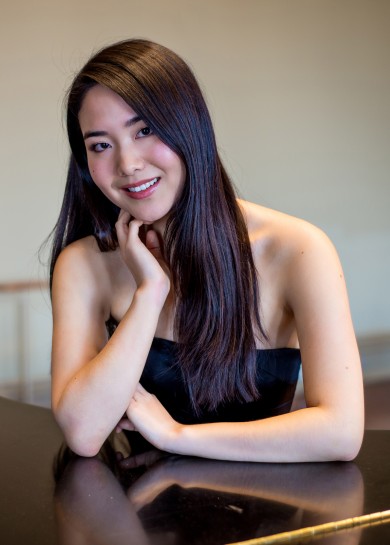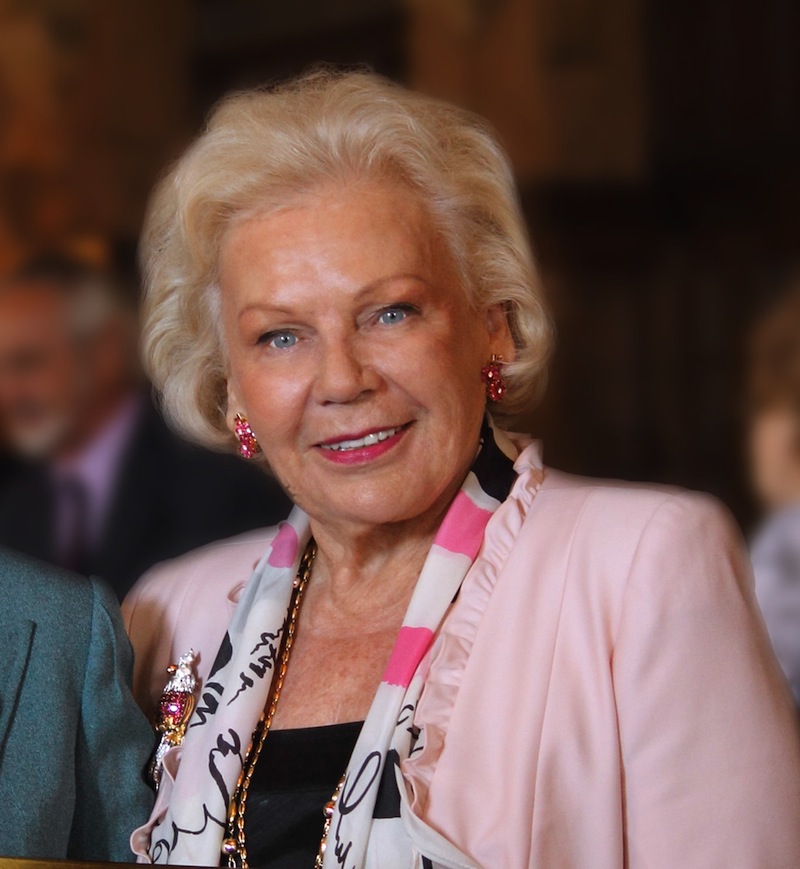Polish composer’s appeal remains timeless for young artists in Chopin Competition

Rieko Tsuchida is among the pianists competing in the U.S. Chopin Competition in Miami, from Friday through March 1.
While many young teens salivate over fresh-faced pop singers, pianist Rieko Tsuchida swooned over a different sort of superstar. “I had a little crush on Li Yundi who won the Warsaw Chopin piano competition in 2000,” she admits.
This week, the 20-year-old pianist will follow in the footsteps of her once-heartthrob by competing in the U.S. National Chopin Competition in Miami. Tsuchida is among 24 American pianists between the ages of 17 and 29 who will perform a dizzying array of the Romantic-era composer’s works in the four-round competition held between February 20 and March 1 at Miami-Dade County Auditorium.
Presented by the Chopin Foundation of the United States once every five years, the Miami event gives promising young artists the opportunity to compete for a concert tour organized by the foundation, and of course, a generous cash prize. In honor of event’s 40th anniversary, the top sum has been raised from the standard $20,000 to $75,000, the highest of any US piano competition.
“I think this is the most major competition for young American pianists,” says Jon Nakamatsu, an established concert pianist who won the competition in 1995 at the age of 25. “There are so many of us trying to do the same thing, and to have a competition totally dedicated to a major piano composer and American pianists themselves, is the most important part of what they do.”
Nakamatsu spends eighty percent of the year on tour, records with Parisian label Harmonia Mundi, and puts on the Cape Cod Chamber Music Festival during the summer months. “I never thought all of this would be in the cards for me,” said the pianist, who worked as a high school German teacher before the win. “And it all started in Miami.”
Chopin, the so-called “Poet of the Piano,” was a virtuosic young artist, and his genius as a performer and composer was fostered from a young age. His understanding of the instrument is reflected in his emotive works, which demand remarkable technical and artistic prowess. Many of his pieces, which remain repertory standards, were composed before he left his native Poland and eventually settled in Paris at the age of 20.
For some, the ability to perform the composer’s music—and perform it well—is a rite of passage.
“From a very young age, my teacher told me that if you want to really learn to play the piano you have to learn Chopin,” says Nakamatsu, who will serve on this year’s nine-person jury. “Everything about the piano is encapsulated in his work.”
As in previous years, the six finalists will be flown to the Warsaw International Chopin Piano Competition in April. The top two will be automatically accepted into the competition, bypassing the selection round. The crème-de-le-crème of international competitions, the event is followed by the public and classical music world with great enthusiasm. It has borne a host of keyboard greats, including Martha Argerich, Maurizio Pollini, Li Yundi and Kristian Zimmerman, among others.
The Miami competition follows the same rigorous programmatic, age and education requirements as its Warsaw counterpart. “We want to make sure our winners are fully prepared,” said Jadwiga Gewert, who happily swapped her position as a corporate lawyer for a coal-mining company in Poland for a career as the foundation’s executive director over 22 years ago.
The first U.S. competition was held in 1975 by Miami’s Polish Cultural Center, founded by Polish-born philanthropist Lady Blanka Rosenstiel. Following its success, Rosenstiel opened the Chopin Foundation of the United States just two years later in 1977. The composer’s music is particularly meaningful for the patroness. As a child in Warsaw, she studied his works at the local conservatory but was forced to pause her lessons when Germany overtook the Polish capital during the Second World War.
“It was forbidden to study Chopin’s music and play it at home,” recalls Rosenstiel. “Maybe the Germans knew then that it would motivate Polish people to be more patriotic.”
By then, Chopin’s music had become a coveted cultural keepsake in a country that had long struggled with national identity under the thumb of neighboring powers—Russia, Prussia, Austria—for over 123 years. For some, including Rosenstiel, Chopin’s provocative chromaticism and sweeping melodic lines represent more than just a masterful composition. “His music reflects great emotion, and great feeling for Poland,” she says.
A longing for the Mazovian countryside in central Poland is almost palpable in the composer’s mazurkas, pieces inspired by traditional folk dance and infused with urban influences of the day. With compositions such as the well-known ‘Revolutionary Étude’ it is perhaps unsurprising that Chopin supported the movement for Poland’s independence from Russia in 1830. Already abroad at the time, he aided the cause by creating a musical legacy rife with reference to his homeland. After the uprising failed, Chopin was faced with the choice of accepting a Russian passport or living in exile. He chose the latter, and never again stepped foot on his native soil.
Rosenstiel, too, left Poland at an early age. During the Warsaw uprising of 1944, she, along with her brother and mother were taken to a labor camp in Germany. After liberation, Rosenstiel and her brother settled in Belgium instead of returning to Poland, which was then under Soviet control. In Brussels, she had hoped to continue her studies of Chopin’s music, but, she reflects, “everyone had to work to put food on the table.”
Upon immigrating to the US in 1956, Rosenstiel sought out Chopin and was befuddled by the lack of his music on the radio and in concert halls. “At that time, there weren’t many American pianists who played Chopin,” she claims. Surprised to learn that government funding of the arts was severely lacking, Rosenstiel, who wed distillery magnate Lewis S. Rosenstiel, founded the competition and Chopin Foundation to support the young musicians who would continue Chopin’s legacy in her adopted home.
Naturally, the allure of the composer’s music transgresses national boundaries. “I believe his music speaks to the soul of the listener,” said Gewert of Chopin’s continued contemporary appeal. “Everyone can find something very personal in the longing, the sorrow and sadness, and also playfulness in the mazurkas or waltzes too.”
As part of the foundation’s mission to provide access to classical music, the organization also hosts a free “Chopin for All” concert series in the years between the competition. According to Gewert, the public doesn’t seem to tire of the 19th-century composer: “If there’s not enough Chopin on the program, people just complain.”
Audiences to the eight-day competition in Miami will have no trouble getting their fill, as participants advance through four rounds devoted to his various genres. The highlight will be round four with the Chopin Festival Orchestra under Maestro Grzegorz Nowak. February 28 and March 1. Participants will perform the composer’s piano concertos, lengthy works that require intense skill and preparation. And, for the first time, all events will be streamed live on the Chopin Competition website at chopin.org.
For many involved with the competition, the colossal task of readying a lengthy list of competition pieces is an enjoyable one. Often, this harkens to the relationship many of the performers have with the composer’s music.
“It really goes to the core of the human experience,” says Maria Wietrzynska, a 28-year-old participant. “The longer you study and spend time with his music, the more you discover what a genius composer he is.”
Tsuchida echoed a similar sentiment, “I feel that I can really follow my intuition and heart when I’m playing his music,” she shares. “And honestly, even if I wasn’t doing this competition I would be playing all this music anyway because Chopin is my favorite composer.” Someday, she hopes to have performed all of his works, but for now, “I think this is a pretty good start.”
The National Chopin Piano Competition opens Friday February 20 and runs through March 1 at Miami-Dade County Auditorium. Members of the jury, which includes Ian Hobson, Jon Nakamatu, Agustin Anievas and Kevin Kenner, will perform 8 p.m. February 20. For students and Chopin Foundation members admission is free.
The first three competition rounds take place February 21 through and February 26 between 9:30 a.m. and 12:30 p.m., and between 2 p.m. and 5 p.m., and are free and open to the public. The two-part finals with the Chopin Foundation Orchestra and conductor Grzegorz Nowak will take place 7 p.m. February 28 and 3 p.m. March 1. All events will be streamed live at chopin.org. For tickets go to chopin.org or call 1-800-745-3000 or 1-866-448-7849.
Posted in News
One Response to “Polish composer’s appeal remains timeless for young artists in Chopin Competition ”
Leave a Comment
Tue Feb 17, 2015
at 3:29 pm
1 Comment


Posted Feb 18, 2015 at 9:43 am by Fred and Dora Seltzer
We congratulate the Chopin Foundation for its superb dedication and success in promoting young pianists in their chosen art and Chopin´s music. Our happy association with the Foundation since 1995 gives us much pride to be a small part of its excellent endeavors and progress, and it is with great pleasure that we travel from our second home in South America for this inspiring competition every five years.
Thank you.